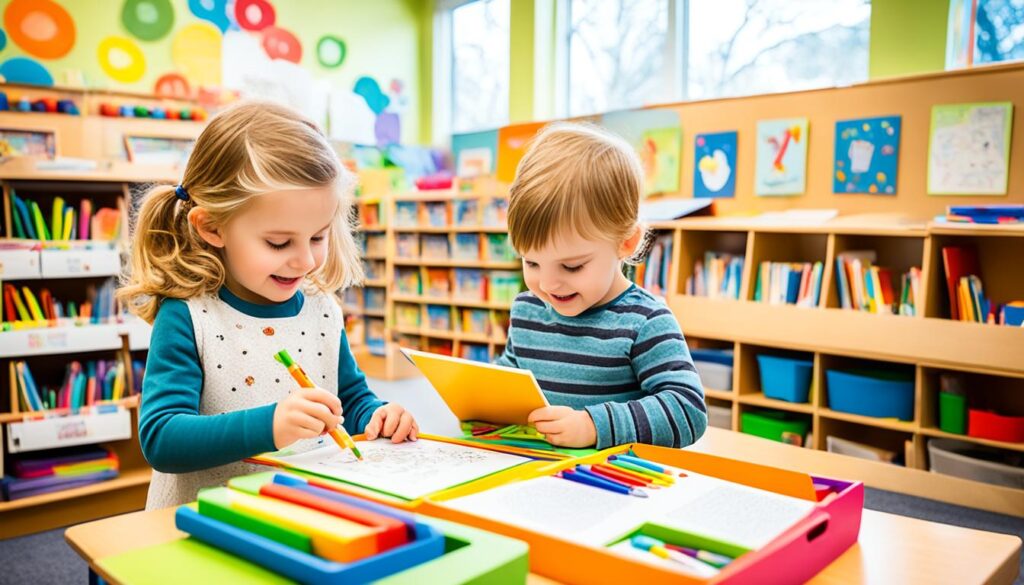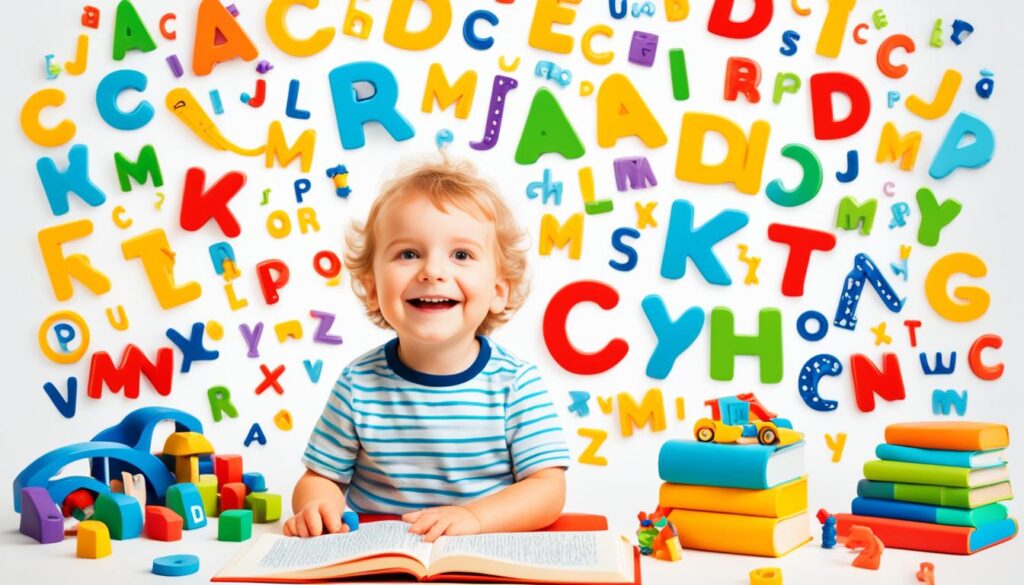Literacy development starts from the moment a child is born. It’s influenced by the child’s experiences with words and stories. These early interactions are key for a child’s readiness to read and write later on.
Emergent literacy is about the basic skills and knowledge kids need before they can read and write for real. Skills like knowing about print and understanding sounds in words are crucial. So, how can parents and teachers help kids develop these important skills?
Key Takeaways:
- Emergent literacy refers to the reading and writing experiences of young children before they learn to read and write conventionally.
- Developing skills such as print awareness, phonological awareness, and vocabulary development are crucial for reading readiness.
- Regular participation in reading and writing activities plays a central role in supporting the development of emergent literacy skills.
- Parents and educators have a significant role in fostering emergent literacy through activities like reading aloud, conversations, and writing practice.
- Health care providers can also play a vital role in promoting early literacy and supporting families in creating language-rich environments.
What is Emergent Literacy?
Emergent literacy includes all actions that lead to standard reading and writing. It covers what young learners do and understand when they play with print. This could involve making mistakes too.
Activities like looking at stories in pictures, handling books strangely, or writing in unique ways are part of it. These let kids learn and have fun with reading materials early on. They start to understand print around them.
Kids get into different reading and writing tasks that help them grow in literacy. They might make up stories, write messages, or pretend to read and act out stories. This helps them grasp how writing is used to share info.
Children learn that writing means something and can share ideas as they explore with it. Letters, words, and sentences become building blocks for them. They’re getting ready for regular reading and writing.
During this time, kids realize that speaking and writing are connected. They see that spoken words can be shown as symbols. They learn we read from left to right and from the top down.
Emergent readers and writers explore and interact with reading materials actively. They learn a lot by trying things out, seeing how others use print, and noticing writing around them.
Next, we’ll look at what emergent readers and writers are like. We’ll see how they move forward in learning to read and write.
Who are Emergent Readers and Writers?
An emergent reader is a kid who likes books but can’t read them alone yet. They might know some words if helped. Emergent readers are just starting to learn about reading and love to explore books.
These young readers are also figuring out how to share their thoughts without using words. They use gestures and sounds to express themselves. As they grow, they start to see how symbols and words help share their messages.
An emergent writer is a kid learning to share ideas through writing. They might draw, scribble, or write letters. These activities help them see how powerful writing can be for sharing thoughts and ideas.
Both emergent readers and writers are learning how to read and write better. By looking at books and trying to write, they lay the groundwork for their future in reading and writing. It’s vital to support their learning and make them love reading and writing.

| Emergent Readers | Emergent Writers | |
|---|---|---|
| Definition | A child who is interested in books but not yet able to read them independently. | A child who is learning to use written language to express communicative intent. |
| Skills | – Reading with support – Developing print awareness – Exploring books and print materials |
– Engaging in drawing and scribbling – Writing letters and symbols – Understanding the role of written language |
| Communication | Has not yet developed intentional or symbolic means of communication. | Learns to convey communicative intent through emergent writing activities. |
| Stage of Literacy Development | In the early stages of literacy development. | Progressing towards developing conventional literacy skills. |
Importance of Early Literacy Instruction
In the past, teaching young kids, especially those with disabilities, focused mainly on simple skills and memorization. Now, research shows that a complete and clear method to literacy is key for everyone. This method involves daily activities of reading, writing, and studying words. It builds basic literacy skills.
Literacy comes from doing lots of different things like listening, speaking, reading, and writing. When kids do these things, they learn how to communicate better. They also get better at remembering and using what they learn.
Starting out, kids do activities that get them ready to read and write well. These activities help them learn about how writing works. For example, they learn to recognize letters, sounds, and start writing.
Skills like understanding what you read and writing down your thoughts are super important for school. Learning these skills early on helps kids think and use language better. This helps them become good readers and writers.
Learning to read and write doesn’t just happen at school. It also happens at home and around the community. Parents, caregivers, and teachers all help kids with reading and writing. Talking, reading together, and practicing writing are ways adults help kids grow their literacy skills. This sets them up to enjoy reading and writing for life.
Key Takeaways:
- Early literacy instruction is critical for all learners, including children with disabilities.
- A holistic and explicit approach to balanced literacy helps develop conventional literacy skills.
- Functional skills, rote memorization, and readiness activities lay the foundation for literacy development.
- Conventional literacy skills are essential for academic success.
- Early literacy instruction occurs not only in schools but also at home and in the community.
Supporting Emergent Literacy at Home
Parents have a key role in helping their child learn to read and write. There are many ways parents can make this happen in everyday life. These tactics can boost their child’s ability to read and write.
Reading Aloud
Reading stories to your child is a great move. It not only makes them love books but also sparks their imagination. When you read different kinds of books, it helps grow their vocabulary and speech skills.
Independent Reading
Letting kids read on their own is also crucial. You can help by filling your home with books and magazines they can read. When kids pick what to read themselves, it makes them more excited about reading.
Conversations
Talking with your child helps too. Take your time when you talk or read with them. Ask questions that make them think and talk more about what they see. This helps them get better at listening and thinking.
Writing Practice
Writing, or even just drawing, is good for learning to write. Give your child different things to write with and let them doodle or write their thoughts. Cheer them on to make writing fun for them.
Using these ideas every day can make your home a place full of learning. They help your child love reading, speak better, and prepare for school. This sets them up for a good future in learning.
Language Development and Early Literacy
Learning languages starts very early for babies, even before they can talk. They learn through interactions with people who care for them. These early conversations are key to developing language, which is crucial for learning to read and write later on.
Responding to a baby’s sounds and gestures is a great way for caregivers to help them learn. This back-and-forth exchange teaches babies the flow of conversation. It also helps them understand words, improve their listening, and pay better attention.
Having lots of words spoken to them is good for babies, but having conversations is even better. These meaningful talks help babies learn and develop their language skills. In fact, the quality of these early conversations can predict how well a child will speak later on.
Reading and telling stories to babies is very good for their language learning. It exposes them to new words and helps them see how language is used. Plus, it’s a special way for caregivers to bond with their babies, making learning fun.

The Importance of Serve-and-Return Interactions
Serve-and-return interactions are essential for babies learning language. Caregivers reply to babies’ sounds and actions, creating a conversation. This strengthens their relationship and helps build the baby’s brain, helping with language and more.
Studies show that babies who have these interactions show better language and thinking skills. They also do better socially and emotionally. Through these exchanges, babies learn how to communicate and lay the groundwork for reading and writing later on.
By engaging in rich language experiences with their babies, caregivers are crucial in supporting their child’s early language and literacy development. This early foundation is vital for their success in learning to read and write.
| Benefits of Language Development and Serve-and-Return Interactions |
|---|
| Enhanced language skills |
| Improved cognitive abilities |
| Stronger social-emotional development |
| Development of language comprehension |
| Expressive language skills |
| Ability to engage in meaningful conversations |
| Foundation for reading and writing skills |
Multiple Language Learning and Literacy
Babies can distinguish between the sounds of all languages when they’re born. By four months, they start focusing on the languages spoken around them. This begins to shape their brain’s language connections.
Introducing kids to more than one language has many upsides. Even when they switch between languages, bilingual kids can keep up with monolingual peers. To grow bilingual, kids need solid support for both languages at home and school.
Learning different languages early on opens kids’ eyes to the world. It makes them more aware and accepting of other cultures. They also get better at solving problems and thinking outside the box.
Starting language learning young helps kids in many ways. They get better at using language, thinking clearly, and understanding others. A rich language environment prepares them for a bright future in our global community.

